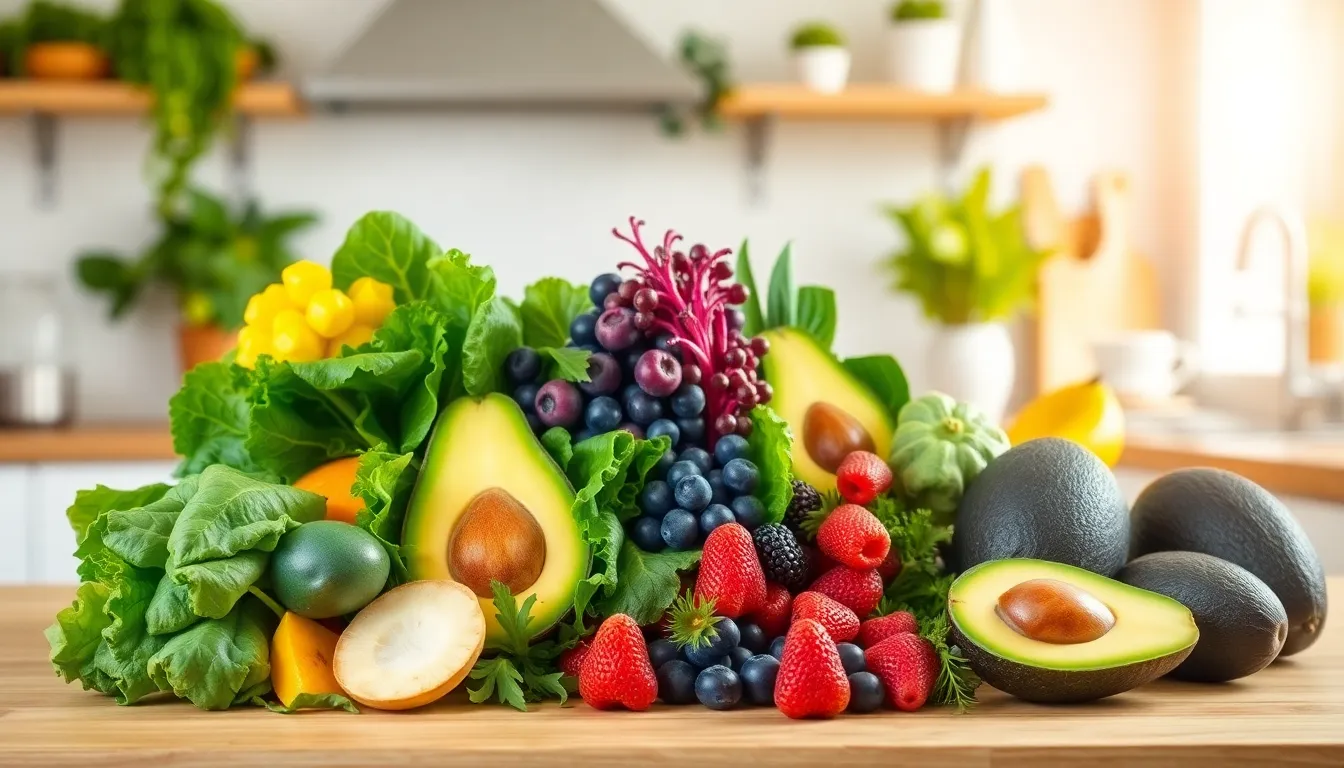When it comes to starting a family, many people think of baby names and nursery colors, but what if the secret ingredient is actually on their dinner plate? Enter the fertility diet—a delicious way to boost reproductive health while enjoying meals that don’t taste like cardboard. Who knew that what you eat could play such a vital role in baby-making?
Table of Contents
ToggleUnderstanding The Fertility Diet
A fertility diet focuses on specific foods that enhance reproductive health. These dietary choices can create a supportive environment for conception.
What Is A Fertility Diet?
A fertility diet includes whole foods rich in nutrients that support hormonal balance and ovulation. Fruits and vegetables, whole grains, lean proteins, and healthy fats play crucial roles. Foods like leafy greens, berries, and nuts provide essential vitamins and antioxidants. Incorporating dairy products can benefit some individuals, while others may choose alternatives like almond milk. Choosing organic options when possible minimizes exposure to harmful chemicals.
Importance Of Nutrition In Reproductive Health
Nutrition directly influences reproductive health and fertility outcomes. Proper nutrient intake can enhance hormonal function and egg quality. Diets high in antioxidants may reduce oxidative stress, positively impacting sperm and egg health. Omega-3 fatty acids found in fish support hormone production and may improve fertility outcomes. Additionally, a balanced diet aids in maintaining a healthy weight, which plays a significant role in fertility. Essential nutrients such as folate and zinc also contribute to healthy reproductive function.
Key Components Of A Fertility Diet

A fertility diet incorporates specific nutrients that directly support reproductive health. Focus on including these essential elements for optimal results.
Essential Nutrients For Fertility
Folate is crucial for cell division and reduces the risk of neural tube defects. Zinc contributes to hormone production and supports ovulation. Omega-3 fatty acids play a role in hormone synthesis while enhancing blood flow to the reproductive organs. Antioxidants, found in vitamins C and E, protect reproductive cells from oxidative stress. Both iron and vitamin D support overall fertility by regulating menstrual cycles and reproductive functions.
Foods To Include In Your Fertility Diet
Include a variety of fruits like berries and oranges that are rich in vitamins and antioxidants. Leafy greens such as spinach and kale provide essential folate. Whole grains like quinoa and brown rice supply complex carbohydrates that stabilize blood sugar. Lean protein sources, including chicken and legumes, support hormone function. Healthy fats from avocados, olives, and nuts contribute to the absorption of fat-soluble vitamins while promoting ovarian function.
Foods To Avoid When Trying To Conceive
Limit processed foods high in trans fats, as they may impair fertility. Reducing caffeine intake, especially over 200 mg per day, can help improve the chances of conception. Avoid alcohol consumption, which may affect hormone levels and reproductive health. Stay clear of high-mercury fish, such as swordfish and shark, to reduce toxicity risks. Finally, minimize excessive sugar and refined carbohydrates that can lead to insulin resistance and hormonal imbalances.
Benefits Of Following A Fertility Diet
Following a fertility diet enhances reproductive health through targeted nutrient intake. Various benefits contribute to overall fertility optimization.
Improved Hormonal Balance
A balanced diet stabilizes hormone levels, promoting reproductive function. Consuming foods rich in healthy fats, like avocados and nuts, supports hormone production. Leafy greens and whole grains provide essential nutrients that regulate hormonal fluctuations. Adequate vitamin D intake, found in dairy products, positively influences ovarian function. Foods high in antioxidants also help reduce oxidative stress, fostering a healthier hormonal environment. Couples experiencing hormonal imbalances may notice improvements by incorporating these dietary choices, promoting a more favorable conception process.
Enhanced Ovulation Regularity
Regular ovulation plays a crucial role in fertility. Including omega-3 fatty acids in the diet can significantly enhance ovulation frequency. Fatty fish, flaxseeds, and walnuts provide these essential nutrients. Iron-rich foods, such as beans and spinach, also support consistent ovulation by addressing potential deficiencies. Maintaining a healthy weight assists menstrual cycle regularity. Emphasizing whole foods and reducing processed foods has shown a connection to improved ovulation rates. Women engaging with a fertility diet may find their cycles more predictable and revitalized.
Boosted Sperm Quality
A fertility diet significantly influences sperm health and quality. Antioxidants, found in colorful fruits and vegetables, protect sperm from oxidative damage. Specifically, vitamins C and E support healthier sperm production. Consuming lean proteins, such as chicken and fish, enhances the nutrient profile essential for optimal sperm formation. Regular intake of nuts can improve sperm motility and increase overall count. Men who prioritize diet show marked improvements in fertility metrics. Adjusting dietary patterns supports reproductive wellness, creating a conducive environment for conception.
How To Create A Personalized Fertility Diet Plan
Creating a personalized fertility diet plan involves understanding individual dietary needs and making informed choices. Effective planning focuses on incorporating the right foods to boost reproductive health.
Assessing Your Current Diet
Start with a thorough evaluation of your current eating habits. Identifying frequently consumed foods helps pinpoint both beneficial and detrimental items. Tracking daily meals offers insight into nutritional gaps, especially regarding essential nutrients needed for fertility. This assessment provides a solid foundation for making meaningful changes.
Making Gradual Changes
Transitioning to a fertility-focused diet doesn’t require drastic changes overnight. Incremental adjustments make sustainability more attainable. Begin by adding one or two servings of fruits and vegetables daily. Gradually, replace processed snacks with whole foods like nuts or yogurt. Smaller, manageable changes create lasting habits, improving overall dietary quality.
Seeking Professional Guidance
Consulting a qualified nutritionist or dietitian proves invaluable in creating an effective fertility diet plan. Professionals can provide tailored recommendations based on individual health history and specific needs. Regular check-ins ensure that dietary changes align with reproductive goals and maintain holistic health. Following expert advice enhances the likelihood of achieving improved fertility outcomes.
Adopting a fertility diet can be a transformative step for those looking to enhance their reproductive health. By focusing on nutrient-rich whole foods and making mindful dietary choices, individuals can create a supportive environment for conception. The benefits of essential nutrients like folate, zinc, and omega-3 fatty acids extend beyond just improving fertility; they also contribute to overall well-being.
Personalizing a fertility diet plan with the help of a nutrition professional can further optimize results. As dietary habits evolve, the journey towards starting a family can become a more informed and empowered experience. Embracing these changes not only boosts fertility but also fosters a healthier lifestyle for both partners.




